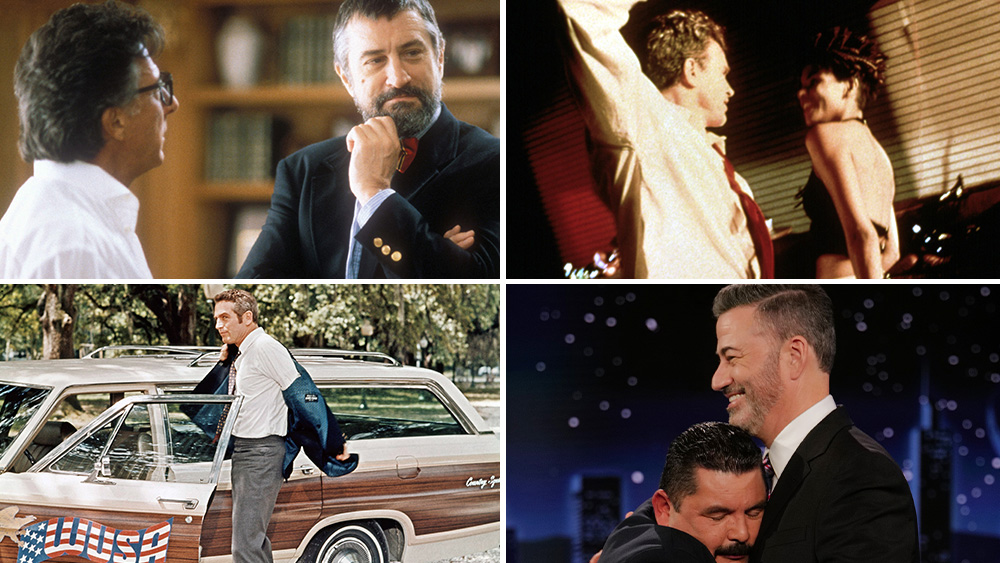
The protests and petitions over Jimmy Kimmel reflected Hollywood’s politicized mood this week but also raised this question: Will this ‘70s-type zeal impact policy, or even color content?
Hollywood veterans see a sad irony in the passing of Robert Redford last week, since his political and social presence rivaled his impact as an actor. Redford, like several others of his generation, defied the myth that political roles would be career-killers. Indeed they made little effort to disguise their political leanings compared with the new generation of “influencers” who are eager to push products rather than politics.
Those unabashedly on the left included the likes of Redford, Paul Newman, Robert De Niro, Dustin Hoffman, Barbra Streisand and Jane Fonda. Their right-wing colleagues included John Wayne, Charlton Heston, Jon Voight and George C. Scott. The upshot: Movies of that epoch were bolder and more strident in their narratives, reflecting a Kimmel style of chaotic humor.
Examples:
A liberal Hollywood spin doctor is hired by a conservative president to cover up a scandal by starting a war, albeit a totally unnecessary war.
A right-wing senator escapes his disastrous involvement in a conflict-of-interest case by hiring an assassin for a hit job – and he is the target.
A hard-drinking TV host decides to kill his autocratic boss when he realizes that he’d actually been hired to engineer a right-wing political coup.
Would movies like Wag the Dog (1997), Bullworth (1998) or WUSA (1970) find financing today?
Today’s cinephiles remember Warren Beatty, age 88, chiefly for the suspense of Bonnie & Clyde (1967) but forget his intellectually demanding drama Reds (1981). In that movie Beatty cast himself as a politically naïve newsman who became sympathetic to the Bolshevik (later Communist) cause. He then fled Russia with Diane Keaton, a social activist, whose politics were equally exotic.
Redford, like Beatty, was a producer as well as an actor in All the President’s Men (1976) and The Candidate (1972). Streisand was producer, director and star of the groundbreaking Yentl (1983) and confounded even her fans by opting for the role of a young boy.
RELATED: Remembering Robert Redford: A Career In Photos
I empathized with these decisions since, in my own personal odyssey of “roles” as newsman and studio executive, I found myself in conflict with some of the stars whose work I admired. While some were reluctant to reveal their political positions face-to-face, others were refreshingly candid.
Newman, a gracious man with a mischievous sense of humor, vigorously refuted my view that his screenplay of WUSA would strike audiences as a shrill “message picture.” A committed liberal, he accused me of being “a closet Republican.” I invited him to go over my head corporately, which he did; he got his movie made but it flopped.
Wayne was calmer and more genial in defending his Vietnam positions (The Green Berets in 1968) and we overcame differences to join forces on True Grit (1969). Fonda and I were not in sync politically but we made a film together (Fun with Dick and Jane in 1977) and were able to smile at our disagreements.
The stars of ‘70s Hollywood, to be sure, did not confront the convoluted ideological and corporate links that present themselves in Trump America. Kimmel and Disney today must defend freedom of speech in opposition to Brendan Carr, the aggressive chairman of the FCC, who can count on support from the White House. At stake are billion-dollar mergers and broadcast licenses. Not since the ominous days of the blacklist in the ‘40s and ‘50s have entertainers faced the threat of permanent career banishment.
In his “peace speech” on his ABC late-night show this week, which has become the second most-watched Jimmy Kimmel Live! of all time, Kimmel made clear his empathy for Charlie Kirk’s widow and her cause but drew the line at this issue: a federal bureaucrat should not be the monitor of what a comedian can or cannot say. Nor should a station group like Sinclair be able to censor content.
There’s a nasty but very funny motion picture comedy in this situation, but I can’t think of anyone today who would venture to make it.

